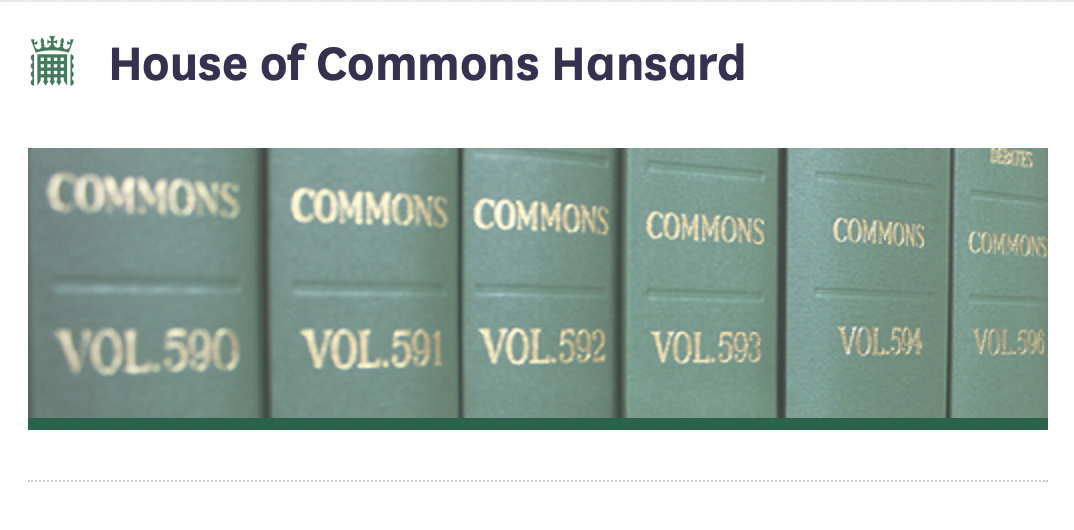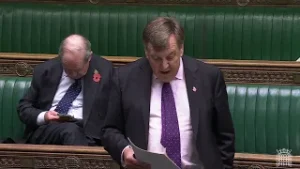 John Whittingdale Conservative, Maldon 2:46 pm, 8th May 2019
John Whittingdale Conservative, Maldon 2:46 pm, 8th May 2019
I am grateful for the opportunity to speak in this debate. As the Minister pointed out, I was the Secretary of State at the time when the licence fee settlement was agreed with the BBC, so I would like to set out some of the reasons why those decisions were reached.
As the Opposition spokesman said, the concessionary TV licence for over-75s is not a fundamental pillar of the welfare state—it was actually introduced by the previous Labour Government. It was introduced to address an anomaly that elderly people living in sheltered housing did not have to pay the full licence fee whereas others did. However, the Labour Government did not introduce free TV licences for all pensioners, on the basis that it was far too expensive to do so—they restricted it to those aged over 75 at a cost, at that time, of £365 million. It is important to realise that that money was not removed from the BBC—it was given to the BBC by the Department for Work and Pensions. It has always been the case, since then, that the cost of exemption from the TV licence is met out of the Government’s budget. The cost to the Government of doing so has risen steadily, so that by last year it had already reached £660 million.
I had the task of negotiating both the new BBC charter and the licence fee settlement. Personally, I would have much preferred that the licence fee had been included within the charter negotiations, since the licence fee settlement, to some extent, pre-empted decisions that we took as a result of the charter review process. However, as the Minister rightly pointed out, we were in very difficult financial circumstances thanks to the profligacy of the previous Labour Government, and we had to take a lot of very difficult decisions. The then Chancellor was clear that we should seek to achieve savings from the BBC, as a publicly owned institution funded by the Government, in the same way that all other public institutions were being asked to find savings. So we agreed with the BBC that it would take over the cost of funding the licence fee concession. However, we were also clear that we had given a pledge that the concession would be maintained until 2020, and therefore the agreement with the BBC was that it would take it over in 2020.
I have to say to the House that the negotiations with the BBC over that were indeed robust. I remember sitting down with the then Prime Minister, David Cameron, with George Osborne and with Lord Hall, the director-general of the BBC, and we had some good discussions in which Lord Hall argued forcibly that this would have a detrimental impact on the BBC. Therefore, in recognition of that, we also included, as part of the licence fee settlement, agreement to address some of the things the BBC raised as its principal concerns. One was the freeze in the licence fee. The licence fee had not gone up at all for a number of years, and therefore the BBC was looking at a real-terms reduction every year. We agreed that the licence fee should be unfrozen. Secondly, a growing number of people were avoiding paying the licence fee by watching the BBC on catch-up, through the iPlayer. Under the law as it then stood, if someone watched the BBC a mere two minutes after the live transmission, they did not have to pay the licence fee. The licence fee was therefore extended to close what was called the iPlayer loophole.
 Bim Afolami Conservative, Hitchin and Harpenden
Bim Afolami Conservative, Hitchin and Harpenden
Does my right hon. Friend agree with the director-general of the BBC, Lord Hall, that the funding arrangements put in place with the BBC by my right hon. Friend and the previous Prime Minister, David Cameron, represented a fair deal?
 John Whittingdale Conservative, Maldon
John Whittingdale Conservative, Maldon
I am extremely grateful to my hon. Friend, because he allows me to quote the director-general. As I say, our negotiations were robust, but we emerged from them with the director-general issuing a public statement saying that it was
“the right deal… in difficult economic circumstances”.
He went on to say:
“Far from being a cut, the way this financial settlement is shaped gives us, effectively, flat licence fee income across the first five years of the next charter.”
 Ed Vaizey Conservative, Wantage
Ed Vaizey Conservative, Wantage
I do not know whether my right hon. Friend will mention this part of the licence fee deal, but it is worth making the point that the last Labour Governmentimposed on the licence fee a levy to fund broadband roll-out, and because of the success of the broadband roll-out under our Government, we removed that levy from the BBC. While there was a stick with free TV licences, there were carrots with the removal some of the subsidies the last Government had asked the BBC to provide.
 John Whittingdale Conservative, Maldon
John Whittingdale Conservative, Maldon
I am grateful to my right hon. Friend, who was also a key player at that time as a Minister in the Department. He is absolutely right. I mentioned two of the BBC’s requests at the time—the unfreezing of the licence fee and the closure of the loophole—but he is correct to point out that the BBC had always been unhappy about the top-slicing of the licence fee to fund broadband, which it saw as far removed from the purpose of the licence fee. That was another agreement we reached with the BBC, which I think was why the BBC felt that it was a fair and proper settlement.
 Pat McFadden Labour, Wolverhampton South East
Pat McFadden Labour, Wolverhampton South East
The right hon. Gentleman is implying that the BBC was happy with all this at the time, but in the press statement announcing the consultation, the BBC said:
“The BBC could copy the scheme… but we think it would fundamentally change the BBC because of the scale of service cuts we would need to make.”
That is not the statement of an organisation that thinks it can easily absorb this.
 John Whittingdale Conservative, Maldon
John Whittingdale Conservative, Maldon
The agreement with the BBC was that it would have responsibility for maintaining or amending the licence fee concession. The right hon. Gentleman quoted the BBC’s view about the cost of maintaining the concession as it stands, and that view is understandable, since the cost next year will be £745 million, rising to £1.06 billion by 2029-30. I am not at all surprised that Tom Watson was unable to give any commitment that a future Labour Governmentwould maintain the concession at the cost of the taxpayer, since that would be a £1 billion public expenditure pledge.
In recognition of that, the BBC has put forward three different options. It has talked about continuation, which, as Mr McFadden said, it feels is not realistic, as that would amount to the current cost of BBC 2, BBC 3, BBC 4, the news channel, CBBC and CBeebies all put together. It has also suggested some amendment to the concession, or discontinuing it altogether. Each of the three possible amendments to the licence fee concession that the BBC has suggested has some attraction. It has talked about raising the age limit to 77 or 80, which to some extent would reflect the ageing population and maintain roughly the same proportion. A second possibility is to introduce a discounted fee, so that people over 75 would not have to pay the full cost.
 Vicky Ford Conservative, Chelmsford
Vicky Ford Conservative, Chelmsford
My right hon. Friend, who is an excellent neighbour, is making an excellent speech. Many of my constituents who are over 75 have emailed me to say that they want to continue to watch the TV with a free licence, but they are not necessarily also watching the BBC on multiple other devices, as many younger people are. Can my right hon. Friend see a case for older members of the public still being able to watch the BBC via a single device, while younger people watch on multiple devices? Would that sort of system work?
 Rosie Winterton Deputy Speaker (Second Deputy Chairman of Ways and Means)
Rosie Winterton Deputy Speaker (Second Deputy Chairman of Ways and Means)
Order. I reiterate that there is pressure on time, and interventions need to be short.
 John Whittingdale Conservative, Maldon
John Whittingdale Conservative, Maldon
I will of course take account of your guidance, Madam Deputy Speaker, but my hon. Friend raises an interesting point, which I want to touch on as I conclude my remarks.
The third possible amendment would be to limit the concession to those in receipt of pension credit. That would address many of the concerns expressed by Opposition Members about those on very low incomes finding it hard to afford and would introduce an element of targeting, to ensure that those who will struggle to afford the television licence do not have to do so.
There is another change that I ask the BBC to consider, which is not included in its options. At the moment, households are entitled to a free television licence if a member of the household is over 75. It is ridiculous that a household might have four adults of working age who are all bringing in an income, but because they happen to have their grandmother living with them, they do not have to pay for a television licence. I ask the BBC to consider a simple change, to restrict the concession to households that only consist of people aged over 75.
I want to end by saying that this raises fundamental questions about the future of the licence fee. Viewing habits are changing, as my hon. Friend Vicky Fordindicated. Evasion of the TV licence is rising. It has gone up from 5.2% in 2010 to an estimated 7% now, with the advent of new services such as Netflix and Amazon, and soon possibly Apple and Disney. The old argument that every household needs to pay the licence fee because everybody watches the BBC is, I am afraid, beginning to break down, and we are reaching a position where many households watch the huge range of programmes available and never turn to the BBC.
That is why I have always believed that, in the long term, the licence fee is not sustainable. We addressed that at the beginning of the charter review. It is recognised by the director-general, who has said that the BBC needs to look at alternative models and has mentioned the possibility of introducing subscription services on iPlayer. At the moment, there is no alternative to the licence fee because we do not have a system where people who choose not to pay it can be cut off; that was why we reached the conclusion that the licence fee had to be maintained. But in the longer term, that will not be true. There will come a time when the licence fee cannot be sustained, but that will be the task of the future Secretary of State who has the job of undertaking the next charter review.

